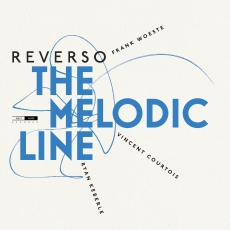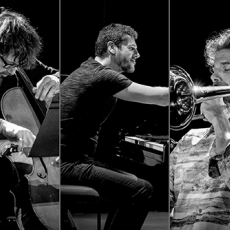Reverso - The Melodic Line Artist - Pop Matters
Reverso is the kind of project that represents music in this new century. It spans continents, genres, influences, and hopefully audiences. An unlikely trio of trombone, cello, and piano, the band fuses jazz, creative improvised music, and European art music without sounding cobbled together.
The sense of musical unity surely flows from the range of talent that is central to each man in the band. French Cellist Vincent Courtois is comfortable in classical chamber music, film music, straight ahead jazz, and free improvisation. Brooklyn denizen and trombonist Ryan Keberle has classical roots and a jazz heart, with expertise in Latin music, big band arranging, and vocal music. Pianist, composer, and producer Frank Woeste (German but also based in Paris) is classically trained but centered on jazz, but with a strong sense of arrangement and sound. Together, the trio makes a remarkable synthetic sound, with trombone, cello, and piano seeming like one instrument—or, at times, possibly ten, but always with a single purpose.
The composers for these nine performances are Keberle and Woeste, who met during a recording session for jazz trumpeter and composer Dave Douglas. Appropriately, given their geographies, they have found inspiration for this set in the music of "Les Six", the legendary collective of classical composers from the early 20th century in Paris—who have often been cited as influences in the jazz world. Milaud (with whom Dave Brubeck studied) and Poulanc may be the best known, at least in jazz circles, but Keberle notes his fascination with Germaine Tailleferre, the only woman among Les Six. A previous Reverso outing worked through the music of Ravel, so this territory has been previously traveled But this set sounds fresher and more distinctive.
The Melodic Line is, on top of everything else, a fluid joy—impossible to hear as anything other than beautiful. Keberle's "Up North" is one of the tunes that takes advantage of the remarkable kinship between the trombone and cello, giving them mellifluous, sumptuous unison lines, then splitting them into two voices that complement each other in counterpoint. The rotating chords from the piano provide a round bed of sound, and then the two melody instruments play with a tonal richness that blends into one whenever they need it to.
Keberle hasn't written a jazz tune—that is, we don't just get a chord sequence with a hip tune on top but rather a complete composition with composed sections and themes, repetitions and variations, including composed elements the sit beneath improvisation by Woeste. The trombonist's "Sisters of Mine" sets of even more complex counterpoint for the cello and the horn, but as players they are expert at achieving a blend. The shape of the composition sounds classical, but the arc of the melodic line and the progress of the harmonies reflect the sensual side of modern jazz.
Woeste's writing is every bit as attractive. "L'Arlequin lunaire" is busy but fluid, with a prominent bass melody that is shared by the piano's left hand and the trombone. The cello and Woeste's right hand connect in counterpoint, with both parts cycling around each other like a graceful spring bird in flight. "Blue Feather" is built on a syncopated figure for piano and cello, over which the trombone builds a toggling theme. Woeste's solo plays out against a set of flamenco-ish handclaps, joined eventually by Keberle's improvising trombone.
"Absinthe" also has a playful and bouncing rhythm at its heart, established by the cello and piano, and Woeste achieves a fully orchestral effect by moving the cello to the melody for the tune's second section and then adding a whistle to the melody in the next section. This performance features the pianist's most playful improvisation as well as a trombone solo set mainly over the cello and piano playing the original bouncing figure.
There are also compositions here that skew more fully toward the European. Woeste's "Martparnasse" uses a set of repeating arpeggios surrounded by shifting harmonies. Courtois improvises in a manner that avoids any reference to the blues, with Keberle and Woeste grinding and throbbing but never swinging. Keberle's "Sisters of Mine" is a beautiful and ambiguous theme that uses a set of impressionist harmonies. "Major Jack" sounds particularly formal in its chattering 8/8 opening and then a series of written sections that resist a sense of groove. But each of these tracks, still, finds ways to welcome creative invention, sounding part of a larger aesthetic.
The closing performance, Woeste's "Clara", blends the different impulses of Reverso in a particularly balanced way. With a folk-music-like simplicity enriched by carefully placed flashes of more complex harmony, the trio plays with exceptional consonance—truly one voice. The middle range of the piano and the cello's low arco playing form a luscious unison, and when Keberle adds his trombone, the spell just grows deeper. Courtois improvises, in contrast, pizzicato in his upper range, creating a delicious contrast as horn and keyboard flow like the tide beneath him.
On this tune—and really throughout The Melodic Line—each player improvises with an unlabored flow. The title of the collection is apt, and the music unfolds with a comfort and beauty that should win ears across genres. Although the players have rich backgrounds in jazz, what seems to unite them is not the musical vocabulary that tends to be the background of most U.S. improvisors. Perhaps predictably, Keberle's fluid trombone still gets more wooly than the cello and piano in his solos, but even these moments are buttery and rich. Without being rooted in blues elements, the music still breathes expansively. But the absence is also defining. That warm, comforting quality to the music of Reverso could also be its limitation.
Within the space that this collaboration defines for itself—just cello, trombone, and piano with a few small exceptions, working in a chamber/jazz mode—it's hard to imagine a more expansive and delicious set of compositions and performances, executing with a lush sympathy. Keberle and Woeste, as composers and improvisers, are flush with ideas to engage the ears and evoke emotion.

